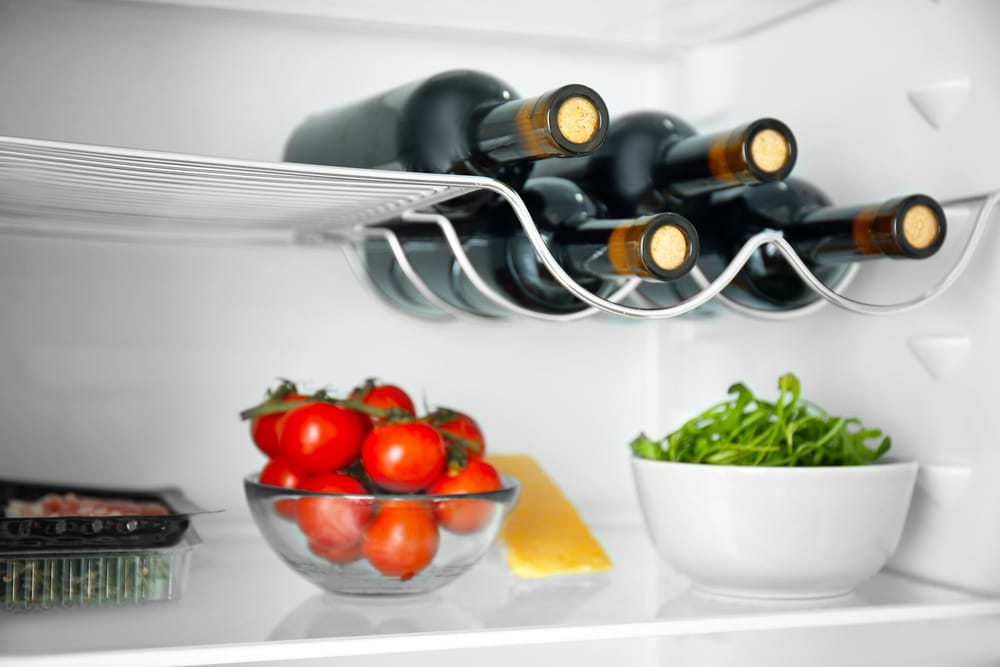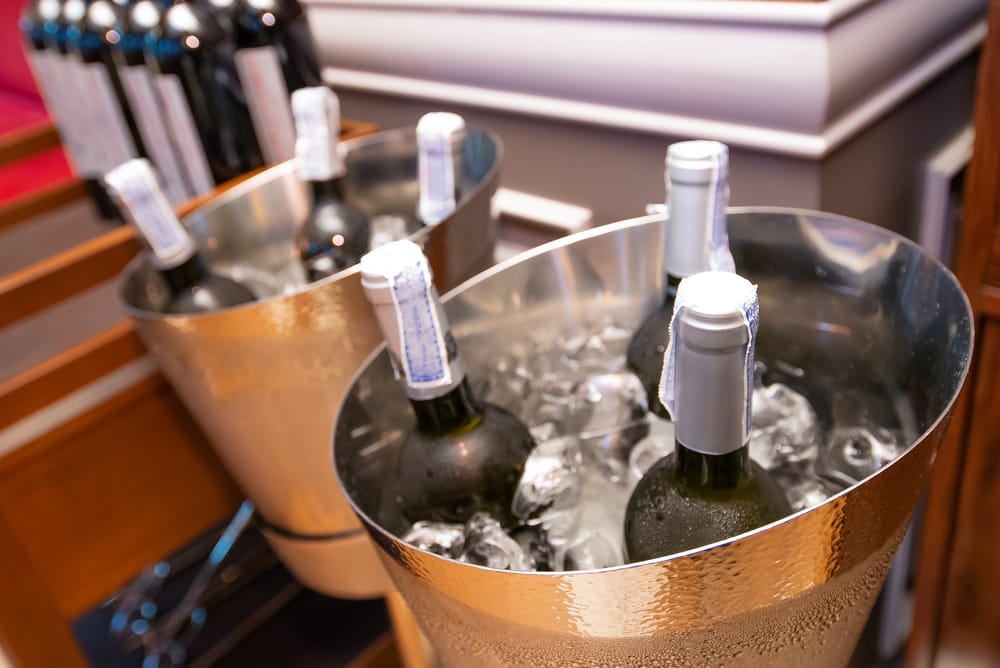Have you wondered if you can freeze your wine?
Maybe you’ve got a half-finished bottle of wine sitting around that is about to go off. You don’t intend to drink it, but you also don’t want it to go to waste. Could you freeze it without it going bad?
The answer is yes, wine can indeed be frozen for later use. However, it’s important to note that once dethawed, the wine won’t be quite the same.
In this guide, we’ll take you through how wine can be frozen, what changes it undergoes once frozen, and how to use the dethawed wine.
We’ll cover:
- Understanding wine’s freezing point and what happens when its freezes
- Tips to avoid accidental freezing
- Wine storage and preservation techniques
- Freezing wine for culinary purposes.
Let’s get into it!
Understanding Wine’s Freezing Point

Before we get into the details of how to freeze wine, it’s useful to understand the science behind how freezing wine works.
The point at which wine freezes depends on two main factors in the wine: alcohol content and sugar content.
The higher the sugar content, the lower the temperature needs to be for wine to freeze.
Likewise, the higher the alcohol content, the lower the temperature needs to be for the wine to freeze.
Therefore, a wine with higher sugar content and high alcohol content will need to be at a lower temperature to freeze than a low-sugar, low-alcohol wine.
With wine typically containing between 10 to 20 percent alcohol, the point at which it freezes is about 25 to 15 degrees Fahrenheit.
In comparison, water freezes at 32 degrees Fahrenheit. Some alcohol with higher alcohol content (such as spirits) will require a temperature beyond a common kitchen freezer to freeze.
However, wine has a lower alcohol content than spirits and should freeze readily in your freezer.
What Happens When You Freeze Wine?
So actually happens to wine when it’s frozen?
One important point to note is that all liquid expands when frozen – and wine is no exception!
Therefore, it’s a good idea to remove the wine from the wine bottle to a more suitable container when freezing.
This is because the glass of the wine bottle may break in the freezer – or alternatively, the cork may come loose from the bottle.
Wine also does not retain its initial quality when frozen, and the taste may change slightly.
Therefore, while it is safe to drink, you may want to consider the way you are using the wine once thawed.
If wine was frozen for a long time, it may be more suitable for culinary purposes rather than served at a dinner party.
You may also be wondering whether the type of wine affects whether it can be frozen!
Both red and white wine can be frozen, though red wine may require lower temperatures due to the additional compounds in red wine.
Freezing sparkling wine is not recommended, however. This is due to the possibility of the sparkling wine creating too much pressure and expansion in the container or bottle.
Tips to Avoid Accidental Freezing
But what about preventing your wine from freezing?
Preventing your wine from freezing is all about ensuring you store your wine correctly.
It’s important you store your wine at a suitable temperature of around 55 degrees Fahrenheit.
In colder months this may prove more challenging, and it’s important to ensure your wine is not left out in temperatures that are too cold.
In addition, if you’re storing your wine in the refrigerator, you should ensure the temperature is not set too cold.
While the wine won’t become solid in the refrigerator, it’s possible that portions may become icy. Additionally, don’t place your wine near the freezer compartment as this area will be colder than the rest of the refrigerator.
Wine Storage and Preservation

At this stage, let’s go over the optimal conditions for storing wine to maintain its quality and flavor.
First and foremost, you want to ensure that your wine is stored at a consistent temperature of approximately 55 degrees Fahrenheit.
This will ensure that the taste and texture of the wine are not altered through chemical changes from temperature shifts!
In addition to ensuring wine is not stored in temperatures that are too cold, it’s just as important to ensure wine is not stored in temperatures that are too hot.
Hot temperatures may cause the cork to push out and encourage oxidization. In addition, the heat itself may warm the wine – causing the flavor of the beverage to become compromised.
Another factor to consider in preventing oxidation is humidity levels. Ideal humidity levels should be between 50 to 60 percent.
If humidity levels are too high this can cause mold and anything too much lower than this may cause the cork to dry out.
To maintain the flavor of the wine, make sure you store it away from sunlight! This is due to the impact of what is often called ‘light strike’.
The sunlight can interact with the amino acids in the wine, altering the taste and smell by creating dimethyl disulfide compounds. Store your wine in a cool and dark area in wine racks instead.
Surprisingly, wine can also be affected by prolonged vibrations or movements in the environment. This may be caused by things like washing machines and dishwashers.
Therefore, don’t store your wine on appliances such as these! While brief exposure to vibration won’t do much, longer-term exposure can alter the texture of the wine through chemical changes.
Lastly, storing your wine horizontally will help to ensure that the cork is kept moist to prevent oxidation.
Freezing Wine for Culinary Purposes
As we’ve seen, while frozen wine is safe, it’s not always maintained to its best, original quality.
However, frozen wine that is thawed can often be perfect for other culinary purposes. Let’s take a look at some ways you can use frozen wine in cooking:
Wine Ice Cubes
A popular way to freeze wine is to place it into ice cube trays. You can then remove the trays when you are ready to use them.
The ice cubes can be used to make slushies, sangria, popped into soda, or any other way you can think of! You can use either red or white wine for this, depending on your preference
Sauces and Gravies
Another excellent, creative way to use frozen wine is in sauces and gravies. You can use ice cube trays, or any other container to freeze the wine, then pop the wine into the sauce when you’re ready.
Again, both white and red wine will work here, depending on the sauce you are making.
Vinegar
You can also make your own vinegar using frozen wine. Simply use a live starter vinegar to ferment your wine and create your own batch.
Jellies
By cooking thawed wine with sugar, lemon juice, and pectin, you can create your own at-home jellies for a perfect summer dessert.
Final Thoughts
To wrap things up, freezing wine is perfectly safe, and a great way to repurpose unused wine so that it doesn’t go to waste!
However, it’s important to remember that the quality of the wine may not always be maintained.
To make the best use of the wine, there are a large variety of ways you can use it in cooking recipes (though it is still drinkable if not frozen for a long period of time).
Aside from freezing wine, the way you store it will also affect the quality of the wine.
To maintain flavor and texture, ensure your wine is stored at a temperature of around 5 degrees Fahrenheit.
You shouldn’t store wine in temperatures that are either too much higher or lower than this.
In addition, the humidity of the air should sit between 50 to 60 percent, and you should keep the wine away from direct sunlight and from prolonged exposure to vibration, shaking, and other movement.
The ideal place to store wine for maximal quality preservation is horizontally in wine racks, in a cool, dry, and dark area.
FAQs
Wine will keep in an airtight container in the freezer for three to six months. You can still consume the wine after this time, though the flavors will likely have been hampered.
Yes, it is safe to drink wine that has been frozen and thawed, even for a long period of time. However, the taste of the wine will likely change.
- Moscato vs Roscato: A Comprehensive Comparison of Sweet Wines - December 15, 2023
- Should White Wine Be Chilled? Expert Insights on Serving Temperature - December 14, 2023
- Moscato vs Riesling: A Sweet Wine Showdown - December 8, 2023










